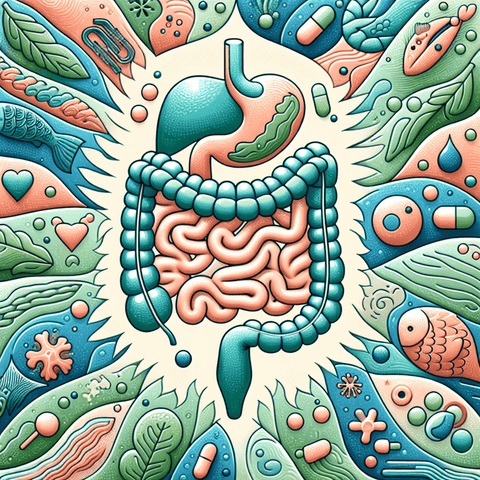Is Vitamin D Good for Mental Health?
Introduction
In recent years, vitamin D has received growing attention not just for its crucial role in bone health, but also for its potential impact on mental well-being. With mental health concerns on the rise globally and vitamin D deficiency still a widespread issue, many are wondering whether this essential nutrient might offer benefits beyond calcium metabolism. The idea that a simple supplement could support mood, reduce symptoms of depression, or contribute to emotional balance is an intriguing one—yet also one that must be explored through science. This comprehensive blog post aims to evaluate the question: Is vitamin D good for mental health? By examining research findings, expert opinions, and practical guidelines, readers will gain a better understanding of whether vitamin D can be a meaningful part of a mental wellness strategy and how to use it wisely.
Understanding Vitamin D as an Essential Nutritional Supplement
Vitamin D, often referred to as the "sunshine vitamin," plays a critical role in human health. It is a fat-soluble vitamin that regulates the absorption of calcium and phosphorus—essential minerals for maintaining healthy bones and teeth. However, its functions extend well beyond skeletal support. Research has revealed its involvement in immune function, inflammation control, neuromuscular function, and even cell growth modulation. This multifaceted nutrient is considered both a vitamin and a prohormone because the body can synthesize it through sunlight exposure on the skin. Specifically, ultraviolet B (UVB) rays enable the body to produce vitamin D3 (cholecalciferol), which is then converted in the liver and kidneys into its active form, calcitriol.
There are two primary forms of this nutrient: D2 (ergocalciferol), typically found in plant-based food sources, and D3 (cholecalciferol), which is found in animal-based foods and more efficiently utilized by the body. Dietary sources of vitamin D include fatty fish such as salmon and mackerel, egg yolks, and fortified foods like milk and cereal. However, food sources alone are rarely enough to meet adequate intake levels, particularly in populations with limited sun exposure. This makes supplementation an increasingly common approach to maintaining optimum vitamin D status, especially in northern climates or during winter months.
The market for vitamin D supplements has grown rapidly, fueled by a growing body of evidence supporting its benefits. Whether people opt for daily capsules, soft gels, or even sprays, supplementation has become a practical and widely endorsed strategy by many healthcare professionals. For individuals with limited diets, darker skin tones (which synthesize vitamin D less efficiently), or medical conditions affecting nutrient absorption, supplements can help bridge the gap between daily needs and actual intake. This growing reliance on nutritional supplementation underlines the broader trend toward preventive health and well-being, which includes addressing not just physical but also mental health needs.
Vitamin D Deficiency and Its Impact on Mental Well-Being
Vitamin D deficiency is a pervasive issue, affecting more than one billion people worldwide. Estimates suggest that about 40% of the European population is deficient or insufficient in vitamin D, particularly during the winter months. Individuals at higher risk include those living in northern latitudes, ethnic minorities with darker skin, the elderly, individuals with obesity, and people who have limited sun exposure due to cultural clothing practices or lifestyle factors such as working indoors. Other risk factors include malabsorption syndromes such as celiac disease and Crohn's disease, both of which impair the body's ability to absorb fat-soluble vitamins like vitamin D.
Deficiency can manifest in various ways. Physical symptoms may include muscle weakness, fatigue, bone pain, and increased susceptibility to infections. However, emerging research over the past two decades has shown that vitamin D deficiency may also have profound effects on mental health. Studies suggest that individuals with suboptimal levels of vitamin D are at a higher risk of developing mood-related disorders, including anxiety and depression. In particular, the association between low vitamin D levels and seasonal affective disorder (SAD)—a type of depression that occurs at specific times of the year, usually in winter—highlights the potential influence of light-mediated vitamin D synthesis on emotional well-being.
Biologically, the connection is plausible. Vitamin D receptors are present throughout the human brain, especially in areas implicated in mood regulation such as the prefrontal cortex and hippocampus. It's been posited that vitamin D plays a role in the synthesis of serotonin—a key neurotransmitter involved in mood balance—as well as in protective mechanisms against neuroinflammation. Chronic inflammation and oxidative stress, both of which have been linked to mental health disorders, are areas where vitamin D’s regulatory capabilities could be profoundly beneficial. Thus, vitamin D deficiency is not just a nutritional issue but a potentially vital factor in understanding the broader landscape of mental well-being.
Mental Health Benefits of Vitamin D: What Scientific Research Reveals
Scientific interest in the mental health benefits of vitamin D has surged, with multiple observational studies, randomized trials, and meta-analyses exploring its potential effects on mood and cognitive functioning. A growing body of evidence supports the notion that maintaining adequate vitamin D levels may contribute positively to emotional balance, stress management, and resilience to mental health disorders. Though it’s important to note that vitamin D is not a standalone cure or primary treatment for mental illness, research points to its supportive role in a comprehensive wellness approach.
Several observational studies have noted correlations between vitamin D levels and mood-related outcomes. Individuals with higher levels of vitamin D in their blood often report better overall psychological well-being and are less likely to exhibit symptoms of depression and anxiety. For example, a 2020 review published in the journal “Nutrients” evaluated outcomes from over 25 studies and concluded that low vitamin D status was significantly associated with higher rates of depression and impaired cognitive performance. Although correlation does not imply causation, the biological plausibility and consistency of these findings strengthen the argument for a causal link.
The underlying mechanisms through which vitamin D may influence mental health include its roles in modulating the immune system, reducing inflammation, supporting neuroplasticity, and engaging in neurotransmitter synthesis. Low-grade systemic inflammation has long been implicated in mood disorders; therefore, vitamin D’s anti-inflammatory effects may reduce risk or severity. Moreover, vitamin D facilitates the production of neurotrophic factors—proteins that promote the survival and function of neurons, which are key to brain health. As a potential modulator of gene expression, vitamin D’s bioactive form (calcitriol) might also influence neural circuits critical for emotion regulation and social cognition.
Meta-analyses of randomized controlled trials (RCTs) have found moderate benefits of vitamin D supplementation on mood. While some trials report no significant effect, others—especially those using appropriate dosages and targeting individuals with known deficiency—demonstrate reduced symptoms of depression and anxiety. These findings underscore the importance of individualized supplementation based on baseline vitamin D status, a consideration echoed by many clinicians today.
Vitamin D and Depression: Exploring the Connection
The link between vitamin D and depression has emerged as one of the most compelling areas of nutritional psychiatry. Depression is a multifactorial disorder characterized by persistent sadness, low motivation, changes in appetite and sleep, and cognitive disturbances. Although traditional treatments such as psychotherapy and antidepressants remain the primary interventions, adjunctive nutritional strategies—like optimizing vitamin D status—are being increasingly investigated for their potential to enhance outcomes.
Multiple clinical studies have examined the relationship between serum 25-hydroxyvitamin D levels and depression. A notable meta-analysis published in the “British Journal of Psychiatry” found that individuals with low vitamin D levels were more than twice as likely to experience depressive symptoms compared to those with optimal levels. Furthermore, intervention studies have provided promising results. A famous 2014 randomized controlled trial involving over 400 participants with major depressive disorder demonstrated that vitamin D supplementation significantly improved Hall Depression Rating Scale scores compared to placebo after six months of treatment.
Another systematic review by Gowda et al., published in “Psychosomatic Medicine,” concluded that vitamin D supplementation led to mood improvements in individuals who were initially deficient. These findings strengthen the hypothesis that vitamin D may not prevent depression per se but may mitigate its severity when deficiency is addressed. Importantly, the therapeutic window seems to be most promising among those with concurrent low levels of vitamin D, suggesting that indiscriminate supplementation in non-deficient individuals may offer limited benefit.
Professional health organizations, including the Endocrine Society and the Institute of Medicine, recommend vitamin D intake based on age, weight, and exposure to sunlight. For mental health considerations, most clinicians suggest individualized testing of 25(OH)D levels and targeted supplementation. For those looking to support their mood naturally, high-quality supplements from trusted sources such as Topvitamine’s vitamin D range provide a convenient and science-backed solution.
Vitamin D Supplementation for Mental Wellness: Tips and Considerations
If you're considering vitamin D as a tool to support your mental health, there are several practical considerations to keep in mind. First and foremost, it's essential to determine whether you're actually deficient. This can be done through a simple blood test that measures serum 25-hydroxyvitamin D levels. Generally, values below 20 ng/mL indicate deficiency, while levels between 20-30 ng/mL are considered insufficient. Optimal ranges often fall between 30-50 ng/mL, although exact recommendations can vary among experts.
For individuals who are deficient or at risk, supplementation is usually both safe and effective when properly administered. Common daily doses range from 1000 to 2000 IU (International Units), though higher doses may be prescribed for short-term repletion under medical supervision. Vitamin D3 (cholecalciferol) is generally the preferred form, as it is more bioavailable compared to D2 (ergocalciferol). It's also advisable to take vitamin D supplements with a meal containing fat to enhance absorption, since it is a fat-soluble nutrient.
While vitamin D is generally regarded as safe, megadosing without medical oversight can lead to toxicity. Symptoms of hypervitaminosis D include nausea, loss of appetite, kidney impairment, and calcium imbalances. Therefore, individuals should follow authorized intake guidelines and consult a healthcare professional before starting high-dose regimens. Additionally, balancing vitamin D with cofactors such as magnesium and vitamin K2 may provide added benefits for both physical and mental health. For example, magnesium plays a critical role in vitamin D metabolism, while vitamin K2 helps regulate calcium absorption in tissues.
To maximize the potential mental health benefits of vitamin D, consider incorporating the supplement into a broader wellness strategy. This might include regular physical activity, adequate sleep, stress management techniques, a nutrient-rich diet, and strong social support. Supplementation should complement—not replace—professional mental health care when necessary. High-quality supplements can provide a reliable dietary source of this essential nutrient, especially for those with modern lifestyle limitations on sun exposure. Choose formulations that meet strict manufacturing standards, such as those available in Topvitamine's vitamin D product collection.
Vitamin D Receptor in Brain: Unlocking Its Role in Mental Health
A key piece of the vitamin D and mental health puzzle lies in the presence and function of the vitamin D receptor (VDR) in the human brain. VDR is a nuclear receptor protein that binds to the active form of vitamin D (calcitriol) and regulates the expression of various genes. These receptors are not randomly distributed but are found in several brain regions involved in mood, cognition, and behavior—including the prefrontal cortex, hippocampus, hypothalamus, and amygdala. This anatomical distribution suggests that vitamin D plays an integral role in brain development and function.
Research shows that when vitamin D binds to these receptors, it can influence genetic transcription related to neuronal differentiation, neurotransmitter production, and synaptic plasticity. For example, studies have demonstrated that vitamin D enhances the synthesis of enzymes required for the production of serotonin and dopamine—neurotransmitters essential for mood regulation. Moreover, it promotes the release of neurotrophins, such as brain-derived neurotrophic factor (BDNF), which support the growth and survival of neurons and may help combat the neural atrophy observed in depressive disorders.
Another fascinating aspect of VDR activity in the brain is its involvement in immune modulation. Microglia, the brain’s resident immune cells, express VDR, suggesting that vitamin D can reduce neuroinflammation—a known factor in mood dysregulation and cognitive impairment. Animal studies further support this protective mechanism; vitamin D supplementation appears to attenuate the progression of neurodegenerative conditions under inflammatory challenge. These findings underscore vitamin D’s neuroprotective potential, linking VDR expression directly with improved resilience and emotional well-being.
As the science evolves, VDR is being explored as a potential pharmacological target for novel mental health therapies. Identifying polymorphisms in genes related to the vitamin D receptor may also allow for personalized treatment approaches in the future, enabling more precise interventions based on individual genetic makeup. For now, ensuring sufficient vitamin D intake remains one of the most accessible ways to engage this powerful receptor system for mental health support.
Conclusion: Is Vitamin D a Key Player in Supporting Mental Health?
Vitamin D has evolved from a nutrient focused solely on bone health to a multifaceted compound influencing many physiological systems, including mental wellness. The relationship between vitamin D and mental health is supported by a growing body of observational and clinical evidence linking deficiency to an increased risk of mood disorders such as depression and anxiety. It also involves mechanistic pathways, including modulation of inflammatory responses, regulation of neurotransmitters, and activation of vitamin D receptors in brain regions tied to mood regulation.
Although vitamin D is not a standalone solution or treatment for mental illness, addressing deficiency and optimizing intake can play a meaningful role in a well-rounded approach to mental health. Responsible supplementation, backed by testing and medical guidance, is a practical strategy for many, especially those with limited sun exposure or dietary constraints. As research continues to uncover the extent of vitamin D’s impact on the brain, public awareness and health initiatives should emphasize its relevance in both physical and emotional well-being.
For those looking to take charge of their mental wellness, high-quality supplements like those available in the Topvitamine Vitamin D Collection can ensure safe and effective support. Combined with a healthy lifestyle and appropriate clinical care when needed, vitamin D offers promise as one piece of the mental health puzzle—an accessible nutrient with the potential to brighten not just our bones but our minds as well.
Q&A Section
Q1: Can vitamin D help with anxiety?
A1: Some studies suggest that adequate levels of vitamin D may help reduce anxiety symptoms, especially in individuals who are deficient. However, more research is needed to determine a causal relationship.
Q2: How much vitamin D should I take for mental health support?
A2: Recommended intake varies, but a typical daily dose ranges from 1000 to 2000 IU. Always consult a healthcare provider before starting supplementation, especially for higher doses.
Q3: Is it possible to get enough vitamin D from food alone?
A3: It's challenging to meet daily requirements through diet alone, especially if you have limited sun exposure. Supplementation is often recommended for at-risk individuals.
Q4: What form of vitamin D is most effective?
A4: Vitamin D3 (cholecalciferol) is generally considered more effective at raising blood levels than D2 (ergocalciferol).
Q5: Can taking too much vitamin D be harmful?
A5: Yes. Excessive intake can lead to toxicity, causing symptoms like nausea, kidney issues, and calcium imbalance. Stick to advised doses and monitor levels if supplementing long-term.
Important Keywords
Vitamin D, mental health, depression, anxiety, mood support, vitamin D supplements, neuroinflammation, serotonin synthesis, vitamin D receptor, vitamin D deficiency, nutritional psychiatry, immune system, supplementation for depression, vitamin D sources, vitamin K2, magnesium, immune modulation, Topvitamine, mental wellbeing supplements.



